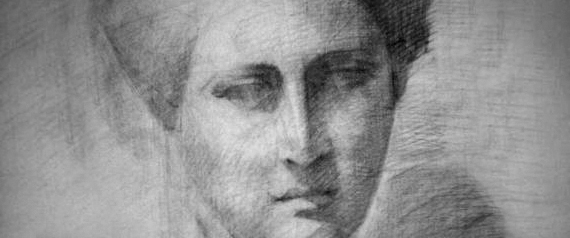In the Orphic Hymns, we read these lines:
"I am a child of earth and starry heaven
But my race is of heaven alone."
When we come into existence we sign up for a life-long adventure. Not only we drink from the water of forgetfulness (lithe) but we also lose track of the only thing that could help us and guide us through all the sorrows and hardships of human experience. And that is our divine self or else, the real self.
Looking in the mirror we see only the external and it's hard to go pass that, since we have learned that it's the only thing counts. The veil that hides our true self though is of our own doing and we need to fight against those tendencies of ours that continually and tirelessly put it there.
We sail the sea like Ulysses looking for the way "home," for our true self, the one we left behind. We know that it awaits us and we long for it because without it we feel incomplete.
And like Ulysses we encounter all sorts of difficulties, dangers and temptations, not to mention the wrath of angry Poseidon. And yet we go on, because we have all the knowledge we need within us.
Plato tells us that our knowledge is in a dormant state and we need to shake it up, we need to remember. The sirens and the monsters can't touch us if we remember who we are.
The act of enthymesis
When Pythagoras was offered by Hermes the chance to have anything he wished for his request was total memory (mneme). He wished to remember everything that had happened to him during his lifetime and even before.
That is how he "remembered" that in a previous life he was Euphorbos, the warrior from Troy who wounded Patroclus and was killed by Menelaus. Pythagoras remembered many of his former incarnations, according to Diogenes Laertius and formed many of his views as a result.
Enthymesis or remembering is the way that leads to the forgotten knowledge and the divine self. We want to come in contact again with our true nature and one way to do this is through the stimulation of our imagination, achieved through the Socratic dialectic. We can also use different spiritual practices and meditation as a means to really "listen" to our inner voice.
We need to become active in our sense of self and really understand the essence of our being. We shouldn't be like Heraclitus says, "men who do not know what they are doing when awake, same as they forget what they do in their sleep."
The moist soul
At the Allegory of the Cave by Plato, Socrates talks about the people who live in a cave like prisoners, chained on a wall and unaware of the outside world with it's beauty and splendor. "They see only their shadows or each other's shadows, which the fire throws onto the wall of their cave" and "to them, the truth would be literally nothing, but the shadows of the images..
Socrates points out how difficult it would be for the prisoner who escapes from the cave to realize that what he saw before was nothing but an illusion. The prisoner who can free himself from this condition is the one who turns to philosophy and is able now to watch the sun with his own eyes.
We know that we need to transform ourselves, leave behind the misty cave, that which is not really us and embrace the hidden flame, the spirit within us which we have neglected for so long. Our true destiny comes along to meet us then, because we know we have a life purpose and we know that if we do nothing about it, it will haunt us.
"A man, when he gets drunk, is led by a beardless lad, tripping, knowing not where he steps, having his soul moist," says Heraclitus, with water, which represents passions, being the element that intoxicates souls and makes them "heavy" and mortal, whereas fire is the true essence and nature of the spirit. That's why "the Dark" philosopher says: "The dry soul is the wisest and the best."
Forget the illusions with which you have fed yourself all this time. Find the fiery core and follow it unconditionally. Heraclitus is characteristically blunt when advices humans to detach themselves from the haze and illusion that goes with a "moist soul."
Celestial self
The true self is made of fine materials, it has a divine origin, it can't co-exist with faulty patterns, egotistical behavior and cruelty. And yet, it can help us eliminate all that, because when we are in contact with it we experience light and this light dissolves all shadows.
The real self is like a revelation in many ways. It guarantees a life fulfilled and a life worth living for. It guarantees finding good friends and discovering that what really matters, above all, is the tenderness of a good heart and the connection of well-minded people.
This divine self operates from a higher level. It doesn't concern with things that don't matter but it can recognize all the tricks and wickedness of the trade! It knows the way to the stars as it knows it's way down to earth.
The elements are all here: "We are children of Earth and of starry Heaven," and we know the way up and out of the damp cell of a confined reality. Ulysses reached Ithaca a new man. We can become "new" by remembering the true and eternal soul of our being.
